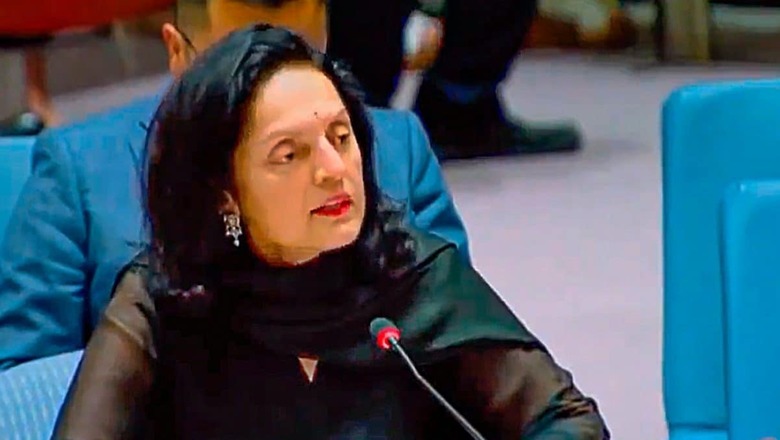
views
India said it is in constant touch with the leaders of Israel and Palestine in the United Nations on Tuesday. It said that India’s message has been ‘clear and consistent’ since the start of the conflict between Israel and Hamas which could lead to a wider conflict in West Asia where it has asked to prevent further escalation of the war.
India also said that it has urged continued delivery of humanitarian aid and early restoration of peace and stability. “The ongoing conflict between Israel and Hamas has led to a large-scale loss of civilian lives, especially women and children, and has resulted in an alarming humanitarian crisis,” India’s Permanent Representative to the UN Ambassador Ruchira Kamboj said on Tuesday in the UN General Assembly, according to a report by news agency PTI.
#WATCH | At the UNGA, Permanent Representative of India to the UN, Ruchira Kamboj says, "The ongoing conflict between Israel and Hamas has led to a large scale loss of civilian lives, especially women and children, and has resulted in an alarming humanitarian crisis…the… pic.twitter.com/QoEhUz2nXg— ANI (@ANI) January 10, 2024
“This is clearly unacceptable and we have strongly condemned the death of civilians,” she said.
Kamboj told the 193-member UN General Assembly that India has noted that the immediate trigger for the ongoing 2023 Israel-Hamas war was the terror attacks on Israel on October 7. She said the attacks were ‘shocking’ and ‘deserve our unequivocal condemnation’.
“India has a zero-tolerance approach to terrorism. There can be no justification for terrorism and hostage-taking,” Kamboj said, demanding immediate and unconditional release of those taken hostage. “The message that India has conveyed since the start of this conflict is clear and consistent. It is important to prevent escalation to ensure continued delivery of humanitarian aid and to work towards an early restoration of peace and stability. A peaceful resolution of the conflict through dialogue and diplomacy is the only way forward,” Kamboj further added.
The UNGA meeting was held in the backdrop of US veto-ing an amendment proposed by Russia in December to a resolution tabled in the Security Council on delivery of humanitarian aid throughout the Gaza strip.
An amendment to the resolution proposed by Russia was not approved after the US, a permanent member of the Council, cast a veto. This veto triggered the UNGA meeting that was convened on Tuesday. The UNGA is now required to meet and discuss any time a veto is cast in the Security Council by any of the five permanent Council members.
India took note of the adoption of the Security Council resolution aimed towards scaling up humanitarian assistance to the people of Gaza and commended UAE’s “able leadership” in piloting the text.
The 15-nation Council had adopted the United Arab Emirates-drafted resolution that demanded scaling up humanitarian assistance throughout Gaza but had not called for a ceasefire.
After days of intense negotiations and delays on a vote, the Council had adopted the resolution with 13 votes in favour, none against and abstentions by Russia and the US.
Kamboj told the General Assembly that India has so far provided 70 tonnes of humanitarian aid, including 16.5 tonnes of medicine and medical supplies in two tranches to the people of Palestine.
India has also provided five million dollars, including the 2.5 million dollars it provided in December to the UN Relief and Works Agency for Palestine Refugees in the Near East (UNRWA). This will go to support the agency’s core programs and services, including education, healthcare, relief and social services provided to Palestinian refugees, she said.
Kamboj reaffirmed India’s firm commitment to achieving a just, peaceful and lasting solution to the Israel-Palestine issue. “We firmly believe that only a two-state solution achieved through direct and meaningful negotiations between both sides on final status issues will deliver an enduring peace that the people of Israel and Palestine desire and deserve.” She said that for this, India urges the parties to de-escalate, eschew violence and work towards creating conditions for an early resumption of direct peace negotiations.

















Comments
0 comment